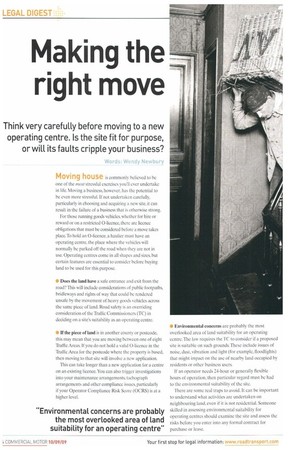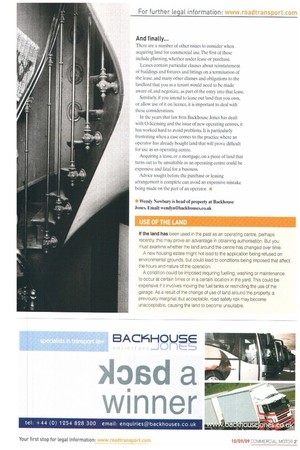Making the right move
Page 26

Page 27

If you've noticed an error in this article please click here to report it so we can fix it.
Think very carefully before moving to a new operating centre. Is the site fit for purpose, or will its faults cripple your business?
Words: Wendy Newbury Moving house is commonly believed to be one of the most stressful exercises you'll ever undertake in life. Moving a business, however, has the potential to be even more stressful. If not undertaken carefully, particularly in choosing and acquiring a new site, it can result in the failure of a business that is otherwise strong.
For those running goods vehicles, whether for hire or reward or on a restricted 0-licence, there are licence obligations that must be considered before a move takes place. To hold an 0-licence, a haulier must have an operating centre, the place where the vehicles will normally be parked off the road when they are not in use. Operating centres come in all shapes and sizes, but certain features are essential to consider before buying land to be used for this purpose.
• Does the land have a safe entrance and exit from the road? This will include considerations of public footpaths, bridleways and rights of way that could be rendered unsafe by the movement of heavy goods vehicles across the same piece of land. Road safety is an overriding consideration of the Traffic Commissioners (TC) in deciding on a site's suitability as an operating centre.
• If the piece of land is in another county or postcode, this may mean that you are moving between one of eight Traffic Areas. If you do not hold a valid 0-licence in the Traffic Area for the postcode where the property is based, then moving to that site will involve a new application.
This can take longer than a new application for a centre on an existing licence. You can also trigger investigations into your maintenance arrangements, tachograph arrangements and other compliance issues, particularly if your Operator Compliance Risk Score (OCRS) is at a higher level.
• Environmental concerns are probably the most overlooked area of land suitability for an operating centre, The law requires the TC to consider if a proposed site is suitable on such grounds. These include issues of noise, dust, vibration and light (for example, floodlights) that might impact on the use of nearby land occupied by residents or other business users.
If an operator needs 24-hour or generally flexible hours of operation, then particular regard must be had to the environmental suitability of the site.
There are some real traps to avoid. It can be important to understand what activities are undertaken on neighbouring land, even if it is not residential. Someone skilled in assessing environmental suitability for operating centres should examine the site and assess the risks before you enter into any formal contract for purchase or lease.
And finally...
There are a number of other issues to consider when acquiring land for commercial use. The first of these include planning. whether under lease or purchase.
Leases contain particular clauses about reinstatement of buildings and fixtures and fittings on a termination of the lease, and many other clauses and obligations to the landlord that you as a tenant would need to be made aware of, and negotiate, as part of the entry into that lease.
Similarly, if you intend to lease out land that you own, or allow use of it on licence, it is important to deal with these considerations.
In the years that law firm Backhouse Jones has dealt with 0-licensing and the issue of new operating centres, it has worked hard to avoid problems. It is particularly frustrating when a case comes to the practice where an operator has already bought land that will prove difficult for use as an operating centre.
Acquiring a lease, or a mortgage, on a piece of land that turns out to be unsuitable as an operating centre could be expensive and fatal for a business.
Advice sought before the purchase or leasing arrangement is complete can avoid an expensive mistake being made on the part of an operator. • • Wendy Newbury is head oi property at Backhouse Jones. Email: wendyn@backhouses.co.uk




















































































































































